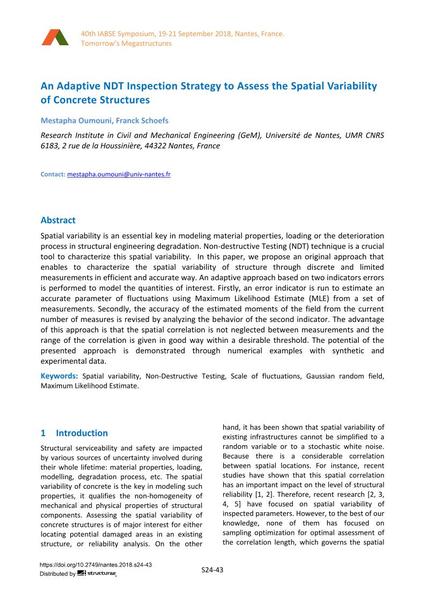An Adaptive NDT Inspection Strategy to Assess the Spatial Variability of Concrete Structures

|
|
|||||||||||
Bibliografische Angaben
| Autor(en): |
Mestapha Oumouni
(Research Institute in Civil and Mechanical Engineering (GeM), Université de Nantes, UMR CNRS 6183, 2 rue de la Houssinière, 44322 Nantes, France)
Franck Schoefs (Research Institute in Civil and Mechanical Engineering (GeM), Université de Nantes, UMR CNRS 6183, 2 rue de la Houssinière, 44322 Nantes, France) |
||||
|---|---|---|---|---|---|
| Medium: | Tagungsbeitrag | ||||
| Sprache(n): | Englisch | ||||
| Tagung: | IABSE Symposium: Tomorrow’s Megastructures, Nantes, France, 19-21 September 2018 | ||||
| Veröffentlicht in: | IABSE Symposium Nantes 2018 | ||||
|
|||||
| Seite(n): | S24-43 | ||||
| Anzahl der Seiten (im PDF): | 8 | ||||
| DOI: | 10.2749/nantes.2018.s24-43 | ||||
| Abstrakt: |
Spatial variability is an essential key in modeling material properties, loading or the deterioration process in structural engineering degradation. Non-destructive Testing (NDT) technique is a crucial tool to characterize this spatial variability. In this paper, we propose an original approach that enables to characterize the spatial variability of structure through discrete and limited measurements in efficient and accurate way. An adaptive approach based on two indicators errors is performed to model the quantities of interest. Firstly, an error indicator is run to estimate an accurate parameter of fluctuations using Maximum Likelihood Estimate (MLE) from a set of measurements. Secondly, the accuracy of the estimated moments of the field from the current number of measures is revised by analyzing the behavior of the second indicator. The advantage of this approach is that the spatial correlation is not neglected between measurements and the range of the correlation is given in good way within a desirable threshold. The potential of the presented approach is demonstrated through numerical examples with synthetic and experimental data. |
||||
| Stichwörter: |
zerstörungsfreie Prüfung
|
||||
